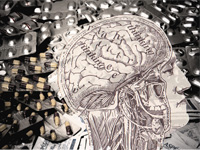Under the proposed revisions, adults experiencing grief and children who throw tempter tantrums could be diagnosed with a mental illness. The proposals have drawn critcism from medical practitioners and a major medical journal,The Lancet.
To explain, the Diagnostic and Statistical Manual of Mental Health Disorders (DSM-5), which is scheduled for publication in May 2013 by the American Pyschiatric Association (APA), presents two major classification changes to depression and children’s mental health.
First, the APA proposes that grief reactions that last longer than two weeks may be diagnosed as depression.
Changes to children’s mental health includes re-drawing the boundaries of attention deficit hyperactive disorder. The APA also proposes the creation of a new disorder called disruptive mood dysregulation disorder, which is characterized by recurrent temper tantrums.
The DSM is a manual that provides standard criteria for the classification of mental disorders. There is concern emerging about the proposed changes, specifically, how medicalizing normal behaviour such as grief and child tempter tantrums leads to the over-prescribing of pharmaceuticals. For instance, an editorial in The Lancet criticizes the inclusion of bereavement and grief as an illness in the DSM. The editorial notes:
“Medicalizing grief, so that treatment is legitimised routinely with antidepressants, for example, is not only dangerously simplistic, but also flawed.”
A recent article in The Guardian, written by a pharmacist, notes that the changes will lead to over-prescribing and utlimately benefits Big Pharma–and the APA has already been accused of undue corporate influence. (A study from the Harvard University ethics center demonstrated how 69% of the DSM-5 task force have financial ties to the pharmaceutical industry).
08/14/12
[photo © flickr.com/Richard Masoner/Cyclelicious and e-MagineArt.com]





